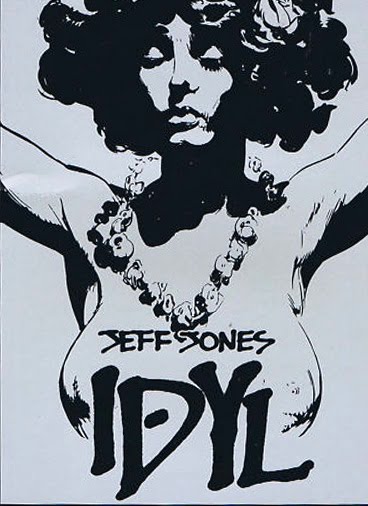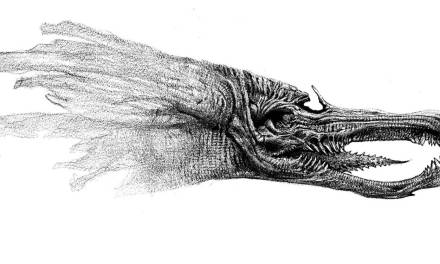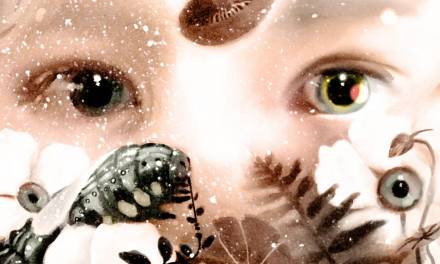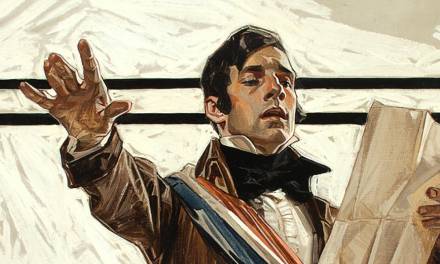By Eric Fortune.
If you’ve read enough artist’s bios you may notice a pattern. Many include the statement “I’ve been drawing since I can remember”. Years of practice and drive to master our craft definitely plays a part. It also reminds me of a saying I heard back in art school which is “Everyone has a 1000 bad drawings inside. The sooner we get those out the sooner we can start making better drawings”. But is that enough?
I’ve had people approach me with their portfolio and show me work that was definitely not at a professional level. When asked how much time was spent on the work I’ve heard “about 10 hours”. It makes you wonder why someone is trying to be in the field if 10 hours is the limit they’ve devoted to a “final” piece of art. Are people interested enough on a personal level to put in extra hours and to refine their work beyond what is necessary even when not asked or to pour themselves into a personal piece they aren’t getting paid for? But perhaps this is a different issue.
So what are the factors that make a great artist? Why is anyone good at anything? This gets into the old nature vs nurture concept. A friend of mine shared this three part documentary series with me entitled “My Brilliant Brain ~The programmes look at a group of remarkable people and poses questions about the origins of genius: are these extraordinary abilities genetic, developed or acquired by accident?” This documentary isn’t about art alone but does shed some light on these questions. It also makes me question my own upbringing and influences(my step father was actually a pretty good artist who would draw and paint with us as children sometimes. I think the bigger influence for me is probably cartoons in the 80’s and video games which had me obsessively drawing robots for about 10 years. I actually made cut out paper robots that could transform into different vehicles with just a few folds. I later upgraded to comics and anime and my art upgraded to muscles, breasts, and a lot of sliced up body parts…..things haven’t changed much since). This film was produced in 2007. I wonder what new things they may have learned since then. It also makes me wonder where I can get one of those magnetic brain pulsey thingies? FYI Small speaker magnets have no affect even after wearing them for days…so my friend told me. If you haven’t seen this before it makes for a great listen while drawing, painting, and getting your art on in general.
View the video here: “My Brilliant Brain”







Interesting question and thanks for the link, will definitely have a look/listen!
Interesting that I just recently stumbled about a TED talk from author Elizabeth Gilbert who had an interesting approach to describe the myth of the origins of the genius as well, the shift in our society that projects the genius into a person, which causes pressure and unnecessary anxiety.
here´s the recommended link: http://www.ted.com/talks/view/id/453
On another note I have to say that Seth Godin has an interesting approach too in his book about the “Linchpin” it can take the anxiety from an artist if one realize that no one is always a genius, and never really has to be. Instead everyone is a genius at times, it comes in tiny bursts, most of the time we produce mediocre stuff, but sometimes that leads to genius stuff and it depends on us to realize this.
A quote:”The tragedy is that society (your school, your boss, your
government, your family) keeps drumming the genius part out.
The problem is that our culture has engaged in a Faustian bargain,
in which we trade our genius and artistry for stability.”
this is an interesting question, eric. an old one, too.
arthur schopenhauer wrote that genius is the ability to see the idea or the essence of something through every imperfect instance of that idea in the world. i.e. not only seeing all the individual horses, each with its own flaws and shortcomings, but seeing the ideal horse in each one of them. (same with the poet/writer and character traits, etc.) its that very idea of horseness that can be captured in an artwork, and through that artwork, everyone can see what horseness is all about.
or so he said 😉 i think the distinction of genius might be a bit harsh, here (because either you have that ability or not, end of story), but something along those lines might apply to the drive to do such things.
also, im not too sure if the talk of ideal horses, ideal characters, etc. can hold up against the beauty of ugliness. as if one could only see the essence of perfect, healthy pidgeons in each pidgeon – one could as well see the ideal broken-wing-pidgeon, with its asymmetric gait, drawing a limp wing, and its own kind of poetry.
but i like the idea that an artist can enable everyone to see something he hasnt seen before, or wouldnt have seen at all.
id say, the more theories about genius, the better – who knows what striking facets of the whole thing we discover along the way? even if each theory for itself has its shortcomings…
Good topic Eric. This sort of gets me thinking about what my motivations for creating art were when I was younger (which is NOT to say that I am anything close to an artistic genius now :P). I don't know about everyone else, but I feel like my enjoyment of drawing started out as a desire to have a personal copy of something for myself. I would copy things like Sonic the Hedgehog, comic book characters, movie characters, anything I thought was cool. And then that desire evolved into wanting to create new scenarios for those characters to act out. Eventually you just decide that you want to make something completely your own. In any case, I find it interesting that (at least for me) it all started from a compulsion to have my own personal Wolverine, and not so much from the pure enjoyment of drawing, though that certainly is what kept me going.
Don't let Greg Manchess see this 🙂
Oooh, I think I saw that documentary! I want the brain pulsey thing too *_*
Cool post! The books “The Talent Code” and “Outliers” are worth checking out on this topic too. Personally, I think talent is a myth. It's just something people say you have after years of hard work at a given skill.
Genius in art can be a weird thing because it's so subjective. There are plenty of famous artists that I just don't get. And some of my favorite artists are “blah” for others.
I'm trying to remember why I drew so much as a kid. It seemed like a treat during school hours. But on my own time it was more a curiosity and a compulsion. I don't remember thinking it was super fun really but more like trying to figure something out. Almost like a really good rpg where after so much experience you finally level up or buy that sick ass sword that's been eluding you. It wouldn't be any fun if it wasn't a challenge.
The “windows of opportunity” for our brain to “use it or lose it” are interesting. And I loved the group of kids who were nurtured at a very young age. I wish they would've interviewed more of them. Perhaps I can look into that.
I drew a lot but was never really good at it. My family was very unsupportive – with my creep of a father actually going as far as to say “That drawing will NEVER leave this house!” It wasn't until I was 22 that I seriously started drawing and it wasn't until I was 29 that I made the big decision to become a professional artist. The only thing that has kept me going is my sheer will.
There are a lot of people out there who think drawing is a talent present at birth. Either you have it or you don't – that's what many think. No, it's a skill that you can learn. Relying on talent alone won't get you anywhere because you'll peak quickly unless you develop that talent into a skill with lots of practice.
I'm on part 2 now…
And this documentary is making me feel like a shitty parent.
Uno, who is 4, is pretty exceptional at Monopoly however.
Monopoly and pickle jokes.
That's almost as important as Chopin, right?
Dan, kinda not surprised about the monopoly thing. I will never play monopoly with you or your family. My soul wouldn't survive the crushing defeat;)
Before I forget, I think something to note is this. If conditioning and environment play a large part in shaping us. Then our current conditions and surroundings will continue to shape us our entire lives. We try our best to live in what we consider optimal circumstances. Recently for myself that has meant letting go of what I see as unnecessary things in order to pursue other more gratifying things…like art.
How else can conditioning benefit us concerning art? I always use the Illustration Masters Class as an example. One surrounds themselves with artist in the top of the field and put in 12-15 hour days for a week. One week of intense training, critical, honest feedback(Dan's feedback and paintover in a prior post was fantastic imo), and like minded people encouraging each other. A year later I see people producing new art that is way beyond their former selves. I'm hopeful the online art communities will continue to do this as well. We should always look to art that is beyond where we are and try to surround ourselves with people that are better than us. If not in real life than at least in other mediums ie books, internet etc. It seems people who are interested in art do this intuitively. But we can all push ourselves to be a little more proactive.
What is genius? “It’s whatcha do with whatcha got.” –Walt Disney
Following on from Jeremy Elder's comment –
Malcolm Gladwell cites the 10,000 hour rule as a reason/method for mastery of one's craft (if not the elusive notion of genius). This'd also back up Edison's famous 'Genius is 1% inspiration 99% perspiration' line.
I tend to subscribe to the idea that mastery of craft is as close as you can get to genius without serendipity stepping in – and serendipity is all that separates the two.
That's just me though!
http://en.wikipedia.org/wiki/Outliers_(book)
Those that try to define genIus, or remonstrate it and claim we all have a bit of genIus have no idea what they are talking about or are simply jealous of the genIus ability !
If you can remember everything you have heard, seen and read, and have the ability to cross-reference, analyze and conceptualize all that information, then you might begin to understand that true genIus is not a gift but a cancer !
There is no such thing as societal pressure for a genIus as any perception is only misconception. The more you know… the less you know (and vice versa) !
The ability to recognize what society or the “experts” want does not require rules, methods or time constraints to deliver those needs ! The answer is there the moment the question is finished !
saya ijin download gambar Anda ia for save my web http://medicalwujiqigong.com and http://hypno-energy.com